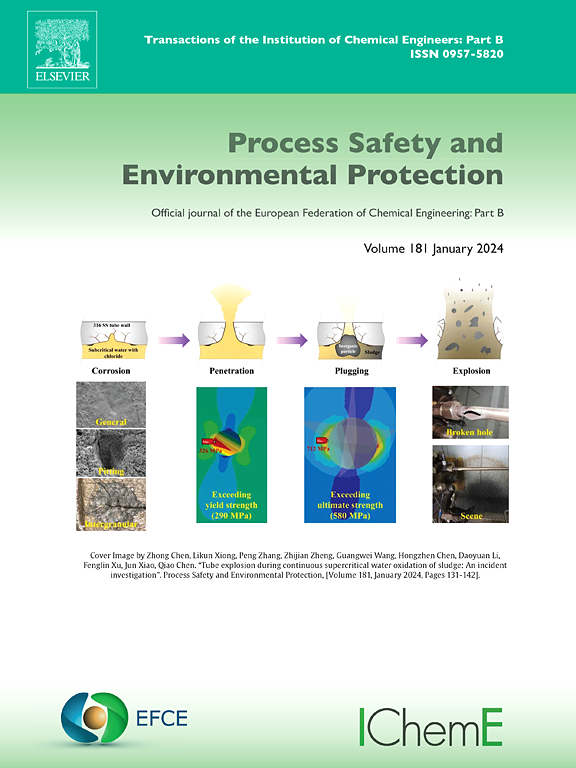利用微波等离子割炬(MPT)消除挥发性有机化合物(VOC)和氟化气体
IF 6.9
2区 环境科学与生态学
Q1 ENGINEERING, CHEMICAL
引用次数: 0
摘要
由于强效温室气体和含氟(F-gases)气体具有很高的全球升温潜能值,因此使用微波等离子体炬(MPT)来消除这些气体至关重要。本研究的目的是利用专门设计的反向涡流反应器(RVR)和火柱反应器(POF)来消除挥发性有机化合物(VOC)和四氟化碳(CF4)。RVR 具有与 MPT 产生协同效应的关键特性,而 POF 配置则因等离子自由基和与 MPT 的大接触面积而显示出高效燃烧。研究使用 Aspen Plus 和 COMSOL 软件分析了异丙醇(C₃H₈O)和 CF4 热分解过程中的质量平衡,并设计了 RVR 和 POF 反应器。利用不含碳氢化合物燃料的 MPT,成功地在大流量气流中破坏了低浓度的 C₃H₈O 和 CF4。对 C₃H₈O 的实验表明,使用 2 千瓦的等离子体功率和每分钟 1 立方米(CMM)的散装气体,对 410 ppm 的 C₃H₈O 污染物的销毁去除率(DRE)达到了 95%。在第二次实验中,当受污染的 C₃H₈O 为百万分之 370 时,销毁去除率为 94%。第一次 CF4 实验的焚毁去除率为 93.3%,等离子体功率为 7 kW,1 CMM 体积气体的污染浓度为 285 ppm。在第二次实验中,由于蒸汽等离子体中存在高活性羟基自由基 (OH*),在等离子体功率为 7 kW、散装气体污染浓度为 180 ppm 的 100 LPM 条件下,焚毁去除率提高到 99.8%。本文章由计算机程序翻译,如有差异,请以英文原文为准。
Abatement of volatile organic compounds (VOCs) and fluorine gases by a microwave plasma torch (MPT)
The use of microwave plasma torch (MPT) in the abatement of potent greenhouse and fluorinated (F-gases) gases is crucial due to their high global warming potential. The purpose of this study was the abatement of volatile organic compounds (VOCs) and carbon tetrafluoride (CF4) using specifically designed reverse vortex flow reactor (RVR) and pillar of fire reactor (POF). The RVR has properties that are crucial for their synergistic effects with the MPT, and the POF configurations showed high-efficiency combustion due to plasma radicals and a large contact area with the MPT. The study used Aspen Plus and COMSOL software to analyse the mass balance involved in the thermal decomposition of isopropyl alcohol (C₃H₈O) and CF4 and to design the RVR and POF reactors. Using MPT without hydrocarbon fuel, low-concentration C₃H₈O and CF4 were successfully destroyed in high-flow streams. The experiment on C₃H₈O showed that using a plasma power of 2 kW and 1 cubic meter per minute (CMM) of bulk gas, a destruction removal efficiency (DRE) of 95 % was achieved for a polluted C₃H₈O of 410 ppm. In a second experiment, a DRE of 94 % was achieved for a polluted C₃H₈O of 370 ppm. The first CF4 experiment achieved a DRE of 93.3 % with a 7 kW plasma power and 1 CMM bulk gas polluted at 285 ppm. In the second experiment, the presence of highly reactive hydroxyl radicals (OH*) in steam plasma improved the DRE to 99.8 % at 7 kW plasma power and 100 LPM bulk polluted at 180 ppm.
求助全文
通过发布文献求助,成功后即可免费获取论文全文。
去求助
来源期刊

Process Safety and Environmental Protection
环境科学-工程:化工
CiteScore
11.40
自引率
15.40%
发文量
929
审稿时长
8.0 months
期刊介绍:
The Process Safety and Environmental Protection (PSEP) journal is a leading international publication that focuses on the publication of high-quality, original research papers in the field of engineering, specifically those related to the safety of industrial processes and environmental protection. The journal encourages submissions that present new developments in safety and environmental aspects, particularly those that show how research findings can be applied in process engineering design and practice.
PSEP is particularly interested in research that brings fresh perspectives to established engineering principles, identifies unsolved problems, or suggests directions for future research. The journal also values contributions that push the boundaries of traditional engineering and welcomes multidisciplinary papers.
PSEP's articles are abstracted and indexed by a range of databases and services, which helps to ensure that the journal's research is accessible and recognized in the academic and professional communities. These databases include ANTE, Chemical Abstracts, Chemical Hazards in Industry, Current Contents, Elsevier Engineering Information database, Pascal Francis, Web of Science, Scopus, Engineering Information Database EnCompass LIT (Elsevier), and INSPEC. This wide coverage facilitates the dissemination of the journal's content to a global audience interested in process safety and environmental engineering.
 求助内容:
求助内容: 应助结果提醒方式:
应助结果提醒方式:


